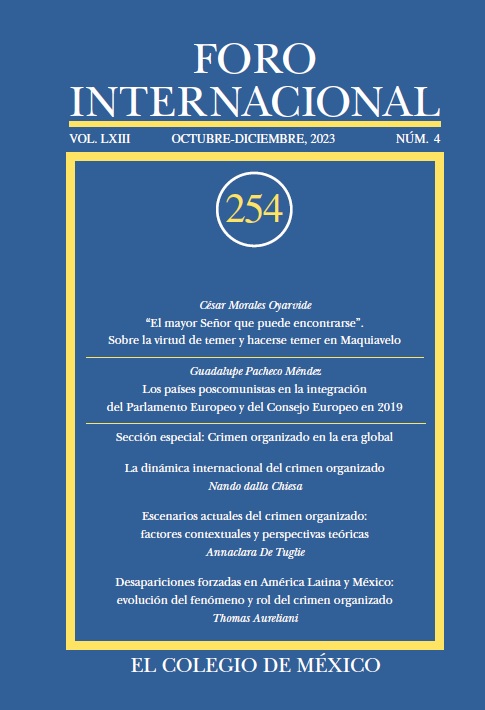“The greatest Master there is”. On the virtue of feeling and inspiring fear in Machiavelli
DOI:
https://doi.org/10.24201/fi.v63i4.3009Keywords:
Machiavelli, emotions, fear, politics, virtùAbstract
This article argues that among the set of emotions that populate the political landscape Machiavelli paints for his readers, fear is not only the most prominent, but the one most closely linked to virtù, the central concept of Machiavellian politics. Starting out from an analysis of the Florentine writer’s innovative conception of virtù, and following Pedullà, a bipartite classification is presented of the uses of fear in Machiavelli’s work: a “virtuous” use, leading to political success, and another that leads to ruin. Through a selection of passages from The Prince and the Discourses on Livy, the key examples of Machiavelli’s virtuous and non-virtuous uses of fear are traced, showing how the ability both to inspire and feel this emotion is linked to several of his most significant pieces of political advice.
Downloads
References
ALTHUSSER, Louis, Machiavelli and us, Londres, Verso, 1999.
BENNER, Erica, Machiavelli’s ethics, Princeton, Princeton University Press, 2009.
BENNER, Erica, Machiavelli’s Prince: a new reading, Nueva York, Oxford University Press, 2015.
BERLIN, Isaiah, Against the current. Essays in the history of ideas, Princeton, Princeton University Press, 2013. DOI: https://doi.org/10.1515/9781400843237
BLACK, Robert, Machiavelli, Nueva York, Routledge, 2013. DOI: https://doi.org/10.4324/9781315779478
BOUCHERON, Patrick, Machiavelli. The art of teaching people what to fear, Nueva York, Other Press, 2020.
CHABOD, Federico, Escritos sobre Maquiavelo, Ciudad de México, FCE, 2015.
CICERÓN, Marco Tulio, Los deberes, Madrid, Editorial Gredos, 2014.
HOCHNER, Nicole, “Machiavelli: love and the economy of emotions”, Italian Culture, 32 (2) (2014), pp. 122-137. DOI: https://doi.org/10.1179/0161462214Z.00000000028
HOIPKEMIER, Mark, “Machiavelli and the double politics of ambition”, Political Studies, 66(1) (2018), pp. 245-260. DOI: https://doi.org/10.1177/0032321717720375
KNOLL, Manuel, “The role of emotions, desires and passions in politics. Machiavelli’s political psychology of motivation”, Lo Sguardo, 27(II) (2018), pp. 49-59.
LEFORT, Claude, Machiavelli in the making (trad. De Michael B. Smith). Chicago, Northwestern University, 2020.
MANSFIELD, Harvey C., “Machiavelli on necessity”, en David Johnston, Nadia Urbinati y Camila Vergara (eds.). Machiavelli on liberty and conflict, Chicago, The University of Chicago Press, 2017.
MAQUIAVELO, Nicolás, Tutte le opere (a cargo de Mario Martelli), Florencia, Sansoni, 1971.
MAQUIAVELO, Nicolás, Discourses on Livy (trad. de Harvey C. Mansfield y Nathan Tarcov), Chicago, The University of Chicago Press, 1993.
MAQUIAVELO, Nicolás, The Prince (trad. de Harvey C. Mansfield), Chicago, The University of Chicago Press, 1998.
MAQUIAVELO, Nicolás, Epistolario 1512-1527, Ciudad de México, FCE, 2013.
MAQUIAVELO, Nicolás, El arte de la guerra, Ciudad de México, Fontamara, 2006.
MCCORMICK, John P., “Machiavellian Democracy: controlling elites with ferocious populism”, American Political Science Review, 95(2) (2001), pp. 297-313. DOI: https://doi.org/10.1017/S0003055401002027
MCCORMICK, John P., Machiavellian democracy, Nueva York, Cambridge University Press, 2011. DOI: https://doi.org/10.1017/CBO9780511975325
MCCORMICK, John P., “Machiavelli’s Agathocles: from criminal example to princely exemplum”, en M. Lowrie y S. Lüdemann (eds.), Exemplarity and singularity. Thinking through particulars in philosophy, literature, and law, Londres, Routledge, 2015.
MCCORMICK, John P., Reading Machiavelli. Scandalous books, suspect engagements and the virtue of populist politics, Princeton, Princeton University Press, 2018. DOI: https://doi.org/10.2307/j.ctv346pfh
PEDULLÀ, Gabriele, Machiavelli in tumult. The Discourses on Livy and the origins of political conflictualism, Nueva York, Cambridge University Press, 2019. DOI: https://doi.org/10.1017/9781316822562
PITKIN, Hanna, Fortune is a woman: gender and politics in the thought of Niccolo Machiavelli, Chicago, The University of Chicago Press, 1984.
QUER, Matías, El arte del miedo. La filosofía política de Maquiavelo, Santiago de Chile, UC, 2022.
ROBIN, Corey, Fear. History of a political idea, Oxford, Oxford University Press, 2004. DOI: https://doi.org/10.1093/oso/9780195157024.001.0001
SARALEGUI BENITO, Miguel, Maquiavelo y la contradicción. Un estudio sobre fortuna, virtud y teoría de la acción, Pamplona, Ediciones de la Universidad de Navarra, 2012.
SKINNER, Quentin, The foundations of modern political thought. Volume one: the Renaissance, Cambridge, Cambridge University Press, 1998.
SKINNER, Quentin, Machiavelli. A very short introduction, New York, Oxford University Press, 2000. DOI: https://doi.org/10.1093/actrade/9780192854070.001.0001
TARCOV, Nathan, “Machiavelli’s Critique of Religion”, Social Research, 81(1) (2014), pp. 193-216. DOI: https://doi.org/10.1353/sor.2014.0005
VISENTIN, Stefano, “The different faces of the people: on Machiavelli’s political topography” (pp. 368-389), en Filippo Del Lucchese, Fabio Frosini y Vittorio Morfino (eds.), The radical Machiavelli. Politics, philosophy and language, Leiden, Brill, 2016. DOI: https://doi.org/10.1163/9789004287686_021













